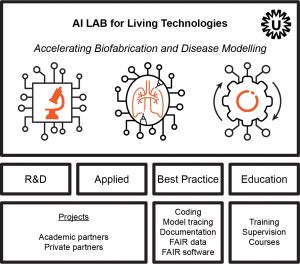
The current mission of the AI lab for Biofabrication and Disease Modelling is to develop and implement AI-based technologies for use in microscopy, bioprinting, and automation. Patient-
derived living cell technologies play a critical role in preclinical biomedical research and may enable the development of personalized, regenerative, and curative treatments. The combination of new emerging AI techniques in the field of computer vision and multivariate modelling, with such living cell technologies will be critical to further drive the impact of these living technologies from the fundamental to clinical domain.
AI technologies will enable the extraction of meaningful data from image-based cellular phenotypes, but also facilitate on-the-fly feedback for automation of cell assays and the bioprinting of complex multicellular 3D living constructs. The AI lab for Biofabrication and Disease Modelling will be a key infrastructure within the USP for data analysis and modelling in biology. Highly experienced AI scientists work with together with biomedical researchers to develop and apply state-of-the-art AI techniques. In addition, we focus on providing best-practices and education on the use of data and AI in fundamental and pre-clinical biology.
Molecular sciences are critical to achieving the promise of precision medicine. With advances in technology, we can measure genome-wide molecular profiles at an unprecedented level of detail. Disease-relevant tissues are routinely assayed using methods such as whole genome sequencing, transcriptomics, and methylome profiling, providing rich multi-modal datasets that elucidate the molecular mechanisms underlying disease and inform the development of novel diagnostics and therapies.
In recent years, machine learning and artificial intelligence have made significant strides, fueled by the explosion of training data and computational power. These developments have enormous potential for molecular science, enabling researchers to tailor state-of-the-art AI algorithms to important biological questions. For instance, deep learning-based algorithm Alphafold2 solved one of the “big” questions in biology: how do proteins fold? This progress demonstrates the tremendous opportunities to apply AI to further advance our understanding of molecular mechanisms underlying disease.
The UMC Utrecht AI lab for Molecular Sciences aims to harness the power of AI to analyze the vast molecular data available and develop new precision medicine approaches. The lab brings together molecular scientists, clinicians, and bioinformaticians to develop powerful AI models that can unlock the potential of the wealth of cohorts and biobanks available at the institution. Through collaboration and cutting-edge research, the lab aims to deliver the next generation of precision medicine.
Imaging is an essential component of modern medicine, employed commonly for diagnostic and prognostic purposes, as well as for selection, planning, guidance, and evaluation of therapies. While medical imaging applications such as MRI or CT scanning fall under the imaging category, it can be defined much more broadly. Nowadays, imaging occurs in many places in a hospital, including pathological assessment and operations.
AI is revolutionizing the imaging field and becoming a key technology that can improve the quality of imaging, automate analysis, and extract deeper diagnostic and predictive information. In image-guided interventions, the fusion of imaging and AI opens up new possibilities to define autonomous workflows that enhance quality and productivity.
The UMC Utrecht AI lab for Imaging and Image-guided interventions aims to develop and evaluate novel technical AI components for disease diagnosis and image-guided interventions. The lab achieves this by promoting interactions between stakeholders, organizing matchmaking events, providing career opportunities for AI talents, and fostering collaboration with industry and other national and international partners.

Mental and physical well-being are utterly important for a happy life. However, we are facing major challenges to keep healthcare available for those who need it. To keep healthcare accessible in the future, we must make smart use of the scarce resources and focus on prevention.
In the AI lab Healthy Living & Prevention, we will investigate how we can use artificial intelligence to avoid the occurrence of disease, further complications challenging health and prevent the unnecessary use of care through personalized prevention, diagnostics and treatment, focusing on how a healthy lifestyle can be encouraged, implemented and maintained.
In some of our projects we will focus on existing clinical mental health and population information to unlock knowledge to better understand, prevent, predict, and treat severe (mental and physical) health problems. By enriching this information with daily life monitoring data from personal devices like smart watches or smart phones (digital phenotyping) we aim to provide personalized insights in to lifestyle, behaviour and health and offer input for prevention in daily life. Furthermore, this AI lab promotes and facilitates collaboration with healthcare partners by collectively learning from data at different organizations in a privacy-preserving manner through federated learning. Federated Learning is a decentralized form of machine learning. Instead of sharing data; algorithms, outcome, and knowledge are shared.
Key challenges are the development of methods for text analysis and algorithmic learning, extracting and connecting data from personal devices with information collected in clinical practice and at primary care settings; automatic pipelines for processing in such a way that it is safe, ethically responsible, explainable and easy to use and that can be implemented in clinical practice. Also, for professionals and patients who are not familiar with complex data modelling. Collaboration and co-creation in our project between professionals, patients, data scientists, designers and people focusing on law & ethics will therefore be crucial.
The AI lab Healthy living & prevention will accelerate data driven learning in (mental) healthcare which is urgently needed given the major societal challenges in this sector. It will also stimulate the transformation into digital care and, through more precise treatment plans, reduce costs in (mental) healthcare. At the same time, we will learn from a general population cohort by collecting data about context and health and in that way gain insights in preventive and protective factors that can be added to our clinical knowledge building. This will also stimulate a shift from a focus on illness to a focus on health and in that way improve healthcare in a sustainable way.

